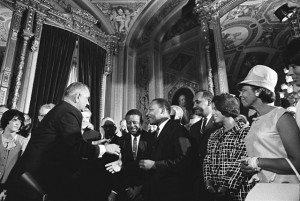
President Lyndon B. Johnson meets with Martin Luther King, Jr. on Aug. 6, 1965 upon signing the Voting Rights Act. Credit: Yoichi R. Okamoto, Lyndon Baines Johnson Library and Museum
On Wednesday morning, the Supreme Court will hear arguments in Shelby County v. Holder, a case with the potential to dismantle the Voting Rights Act. The landmark law, passed nearly 50 years ago and reauthorized by Congress four times, made various forms of voter discrimination in the South, such as poll taxes and literacy tests, illegal. The central issue of the case is whether Congress should continue to review new voter laws in certain states to ensure discrimination is not taking place.
You can read overviews and analysis of the Shelby case on SCOTUSBlog (Made Simple | Symposium), The Atlantic, The New Yorker, The New York Times: Room for Debate Blog and the Washington Post.
Jeffrey Toobin in The New Yorker: “Yet the events leading up to the 2012 election show that the disease of voter suppression has not been cured; rather, it has moved on and mutated. Last year, Judge David Tatel’s opinion in Shelby County v. Holder, for the Court of Appeals for the D.C. Circuit, ratified the congressional judgment that Section Five remains an important bulwark for protecting the right to vote. Tatel found that the statute, far from being obsolete, ‘continues to single out the jurisdictions in which discrimination is concentrated.'”
Andrew Cohen in The Atlantic: “The act didn’t just expand the scope of existing federal civil rights laws. It completely changed the dynamic between voters and state and local governments. And the results are indisputable: There is far less discrimination in voting today than there was half a century ago — and many millions more minority voters.”
Rock the Vote’s Heather Smith in The New York Times: “While we have come a long way since the days of Jim Crow, the truth is that racial discrimination in our voting process is still alive and well in our country, though sometimes more subtle. Young voters are diverse voters, so for this group the Voting Rights Act and its protection of minority voters seem all the more important.”
Constitutional Accountability Center’s Doug Kendall in the Huffington Post: “The story of how quickly conservative politicians abandoned their support for the iconic Voting Rights Act is one of the most depressing examples of the toxic brand of politics that has broken out on the far right.”

